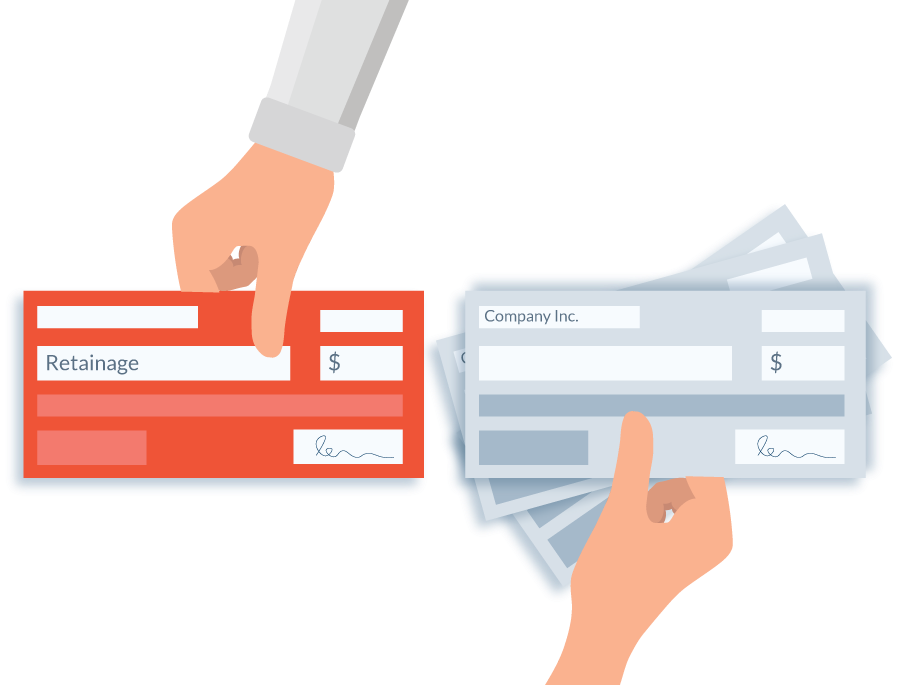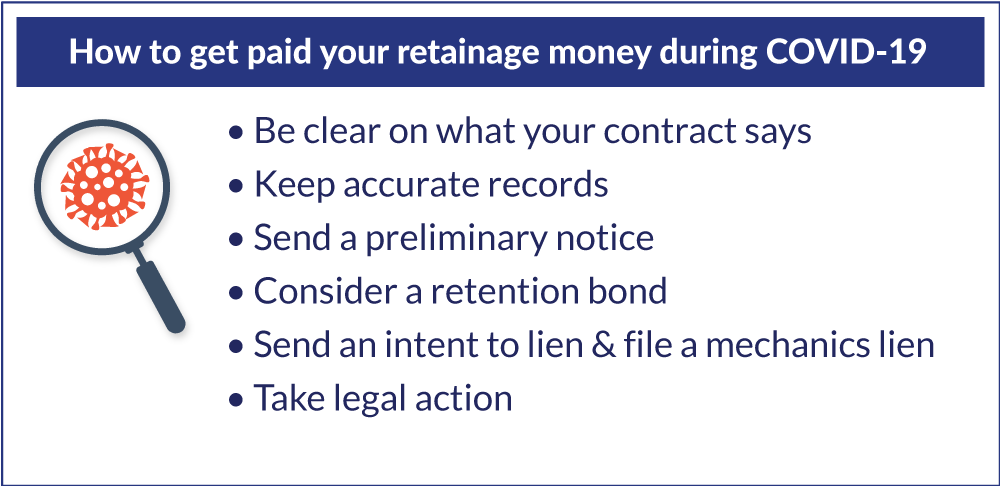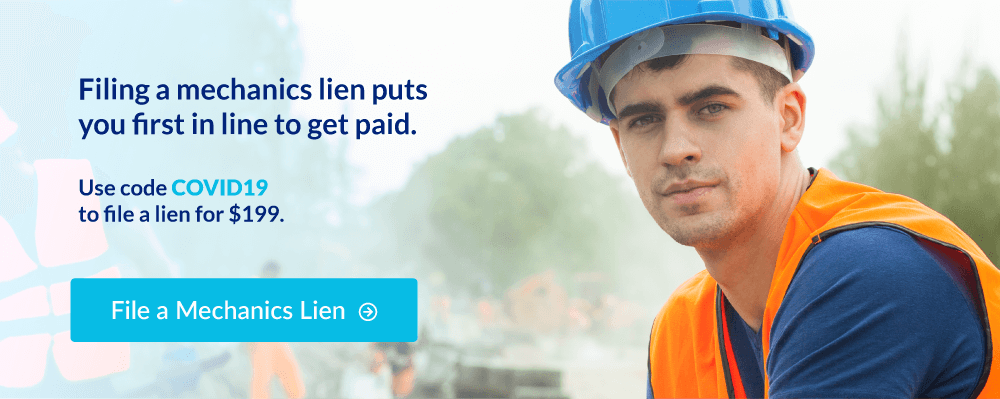
In the coming months, having cash available for your company will be instrumental for contractors trying to survive the COVID-19 pandemic. You have bills, overhead, and man-power, while jobs are getting harder to come by. Collecting on outstanding invoices should be at the top of your Coronavirus To-Do List. If some of that money is tied up in retainage on jobs you’ve already finished, don’t wait until the coronavirus pandemic is over. The time to get paid for it is now.
How retainage works in construction

Retainage is a percentage of each payment withheld from the subcontractor. Retainage, also called retention, is usually in the realm of 5 to 10 percent of the payment. At the completion of the project, that percentage is supposed to be paid to the subcontractor, as per the contract.
In some states, retainage is barred from contracts, while other states only allow retainage to be withheld from the GC. Also, if you’re subject to retainage, you should be sure to have it detailed specifically in the contract. That being said, some states don’t require retainage to be included in the contract before being utilized, in which case retainage misuse can be a serious issue.
Dig Deeper: Read the Ultimate Guide to Retainage in Construction
How and when retainage should be paid
Ultimately, retainage requirements are governed by the construction contract and the laws of the state where your project takes place.
An owner may withhold percentages of the job being paid to the General Contractor. Once certain milestones are met throughout the project, the owner might release a percentage of the withheld money to the General Contractor.
The same situation often plays out between a General Contractor and a subcontractor. Once particular goals towards completion are realized, the GC may pay a percentage of the retained cash.
This is not always the case however, and this is another situation that depends on your state. All of the retained money is often withheld until the completion of the job, either by the owner or the GC. Certain states have statutes that state the money must be paid within a certain time or that a contractor must be paid retainage “within a reasonable timeframe.”
As you can imagine, this can cause major cashflow issues for construction businesses, as retention percentages often exceed profit margins on some jobs.
How COVID-19 can affect retainage and money owed to you
Retainage is already challenging for subcontractors without enduring these difficult times. The practice is prone to unfair leverage and long timeframes before payment is issued. This leads to a serious lack of cashflow during good times, recession aside.
Owners and General Contractors are also being hit by the recession caused by COVID-19, and as such, they’re protecting what assets they have. The most critical of these assets is cash. Even benevolent GCs may withhold cash from subs for as long as possible, as having that money in their account may help them survive the slow-down.
For less scrupulous GCs, predatory tactics may begin to be an issue. For states that don’t have percentage regulations, it’s easy for a General Contractor to hike up retention percentages, especially when they know jobs are scarce and you need the work. Also, terms like “reasonable timeframes” are subject to interpretation, meaning that they’re the gray area a GC might use to hold your money from you to protect themselves during the pandemic.
These tactics can make getting paid so arduous that a large percentage of retainage money goes unclaimed.
How to get paid your retainage money to help survive COVID-19

There are some tactics or directions you can take to recover the retainage money you’ve earned. Keep in mind that some of these tactics may not be applicable in your state, so check Levelset’s retainage map to understand your options.
Be clear on what your contract says
It’s important to understand what your contract says in order to stay alert to your retainage rights during COVID-19. The sooner you catch these issues, the easier it will be to address them and find some resolution. Often, asserting yourself on the terms of the contract while requesting payment is all it takes to recover that retained money.
Keep accurate records
Detailed documentation is the best way to safeguard yourself from overlooking retainage misuse. By employing a rock-solid document retention strategy, you can track all the payments you’ve received throughout the project as well as the amounts retained from you. This will help to strengthen your claim at the completion of the job.
Send a preliminary notice
Preliminary notices are the first impressions that tell a GC that you’re on the job, but may also indicate whether or not you’re professional enough to combat a payment issue. Sending a well-crafted and professional preliminary notice alerts the parties involved that you intend to get paid per your contract. You’re less likely to be pushed around or have your payment applications conveniently misplaced. During the era of coronavirus, sending preliminary notice on every job is more critical than ever.
Consider a retention bond
If the GC or property owner refuses to release your retainage payment, you might consider purchasing a retention bond. When a surety issues a retention bond, they are guaranteeing that the project work will be completed according to the contract. If there is a problem with the work that requires fixing, the surety will make sure that you – or someone else – fixes it. A retention bond replaces the need for the GC or owner to withhold retainage in the first place.
Send an intent to lien & file a mechanics lien
For most purposes, sending a notice of intent to lien will be enough to get payment heading in your direction. No one wants to deal with a lien and all the challenges that it can bring to a would-be productive jobsite.
That being said, should your notice of intent not work, filing a mechanics lien may be the best option to move yourself to the front of the line, forcing someone to deal with your issue first.
There are challenges with retainage and mechanics liens, however, depending on your contract and the state you live in. Some deadlines for filing mechanics liens are shorter than the allowed timeframe for retainage payment. Ultimately, this means that if you wait around for retainage until coronavirus is over, you may lose your lien rights before you even know there’s an issue.
If you haven’t been paid for a job that you’ve already completed, your best bet is to file a mechanics lien – even if you’re just waiting for that final retainage payment.
Take legal action
Should no other tactic work, you might consider taking your lien claim to the courts. This can be an expensive option, but if you have enough retainage money on the line, it can be worth it.
Should you need to take this route, you’ll be glad that you’ve kept accurate and complete documentation of preliminary notices, change orders, mechanics liens, and payment applications that clearly show you’ve been on the wrong side of a bad deal when it comes to recovering the money contractually owed to you.
Understand & enforce your right to recover retainage during COVID-19
Retainage is a common practice in construction. But that doesn’t mean it’s always endeared by subcontractors. Common in both private and government projects, an owner or General Contractor employs retainage to maintain leverage over a subcontractor. This leverage is meant to ensure that contracted subs will see the job through its completion.
Not only does it affect the amount of cash available to a subcontractor, but retainage also has a tendency to be misused or even abused.
When money is harder to come by, like during a coronavirus-fueled recession, owners and GCs are more likely to protect their cashflow before they consider yours.
For that reason, it’s important to maintain detailed records, understand your contract and the laws of the state you’re in. You also want to keep close track of how much is being withheld from you. If retainage is being unfairly withheld during COVID-19, you’ll be prepared to exercise some of your options for getting paid.


